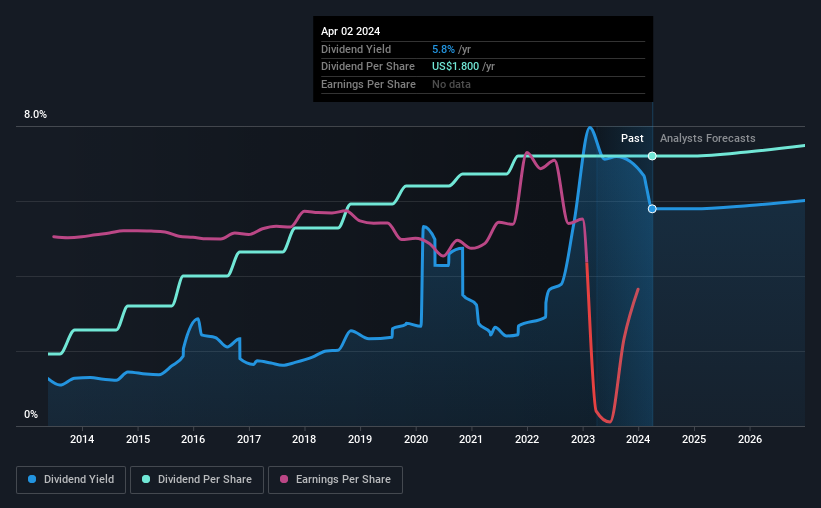Lincoln National (NYSE:LNC) Is Due To Pay A Dividend Of $0.45
Lincoln National Corporation (NYSE:LNC) has announced that it will pay a dividend of $0.45 per share on the 1st of May. The dividend yield will be 5.8% based on this payment which is still above the industry average.
Check out our latest analysis for Lincoln National
Lincoln National's Earnings Easily Cover The Distributions
We like to see robust dividend yields, but that doesn't matter if the payment isn't sustainable. Even in the absence of profits, Lincoln National is paying a dividend. The company is also yet to generate cash flow, so the dividend sustainability is definitely questionable.
Looking forward, earnings per share is forecast to rise exponentially over the next year. If the dividend extends its recent trend, estimates say the dividend could reach 26%, which we would be comfortable to see continuing.
Lincoln National Has A Solid Track Record
The company has a sustained record of paying dividends with very little fluctuation. Since 2014, the dividend has gone from $0.48 total annually to $1.80. This works out to be a compound annual growth rate (CAGR) of approximately 14% a year over that time. It is good to see that there has been strong dividend growth, and that there haven't been any cuts for a long time.
Dividend Growth Potential Is Shaky
The company's investors will be pleased to have been receiving dividend income for some time. However, initial appearances might be deceiving. Over the past five years, it looks as though Lincoln National's EPS has declined at around 34% a year. This steep decline can indicate that the business is going through a tough time, which could constrain its ability to pay a larger dividend each year in the future. On the bright side, earnings are predicted to gain some ground over the next year, but until this turns into a pattern we wouldn't be feeling too comfortable.
Lincoln National's Dividend Doesn't Look Sustainable
In summary, while it's good to see that the dividend hasn't been cut, we are a bit cautious about Lincoln National's payments, as there could be some issues with sustaining them into the future. In the past the payments have been stable, but we think the company is paying out too much for this to continue for the long term. We don't think Lincoln National is a great stock to add to your portfolio if income is your focus.
Market movements attest to how highly valued a consistent dividend policy is compared to one which is more unpredictable. Still, investors need to consider a host of other factors, apart from dividend payments, when analysing a company. As an example, we've identified 1 warning sign for Lincoln National that you should be aware of before investing. Is Lincoln National not quite the opportunity you were looking for? Why not check out our selection of top dividend stocks.
Have feedback on this article? Concerned about the content? Get in touch with us directly. Alternatively, email editorial-team (at) simplywallst.com.
This article by Simply Wall St is general in nature. We provide commentary based on historical data and analyst forecasts only using an unbiased methodology and our articles are not intended to be financial advice. It does not constitute a recommendation to buy or sell any stock, and does not take account of your objectives, or your financial situation. We aim to bring you long-term focused analysis driven by fundamental data. Note that our analysis may not factor in the latest price-sensitive company announcements or qualitative material. Simply Wall St has no position in any stocks mentioned.

 Yahoo Finance
Yahoo Finance 
